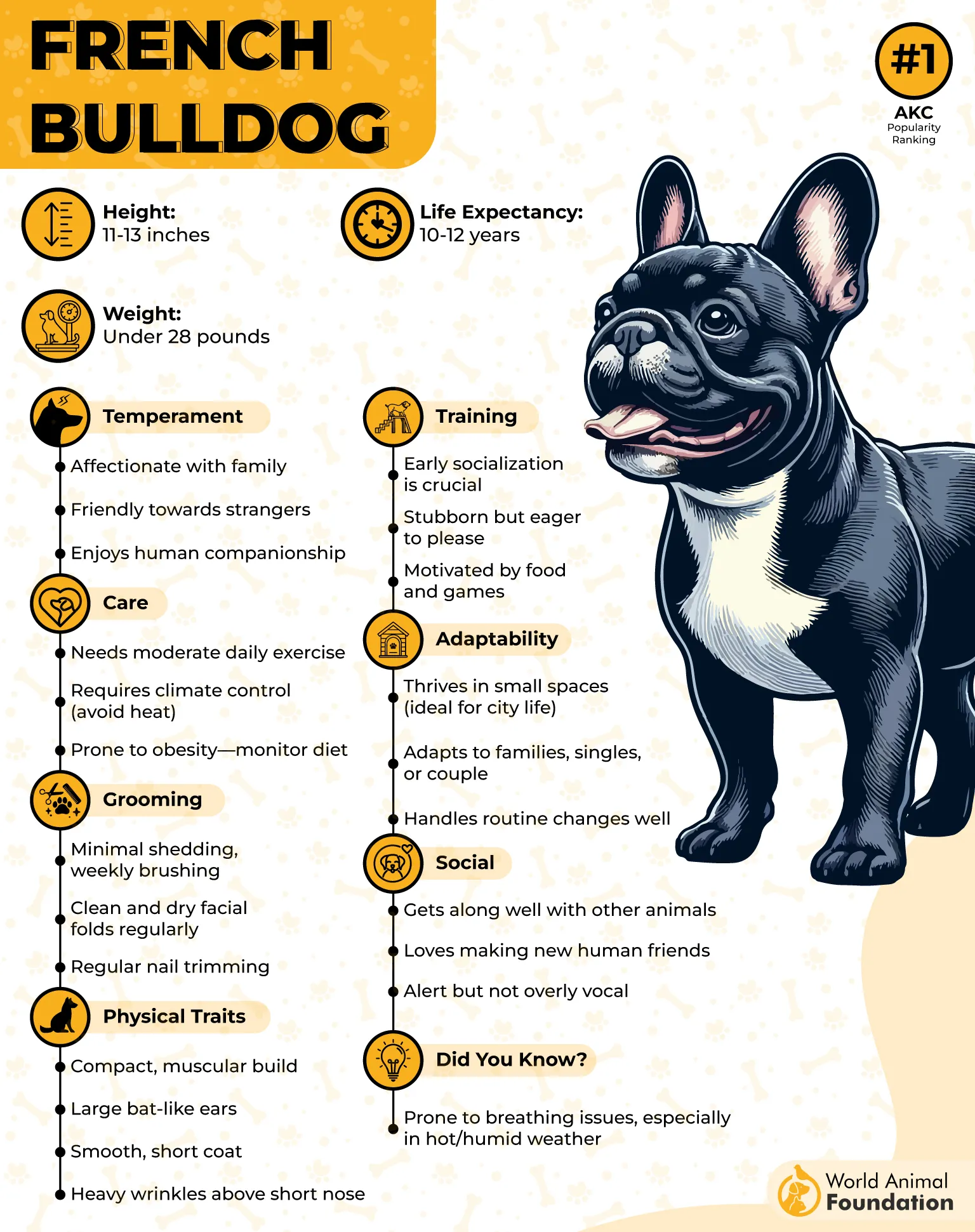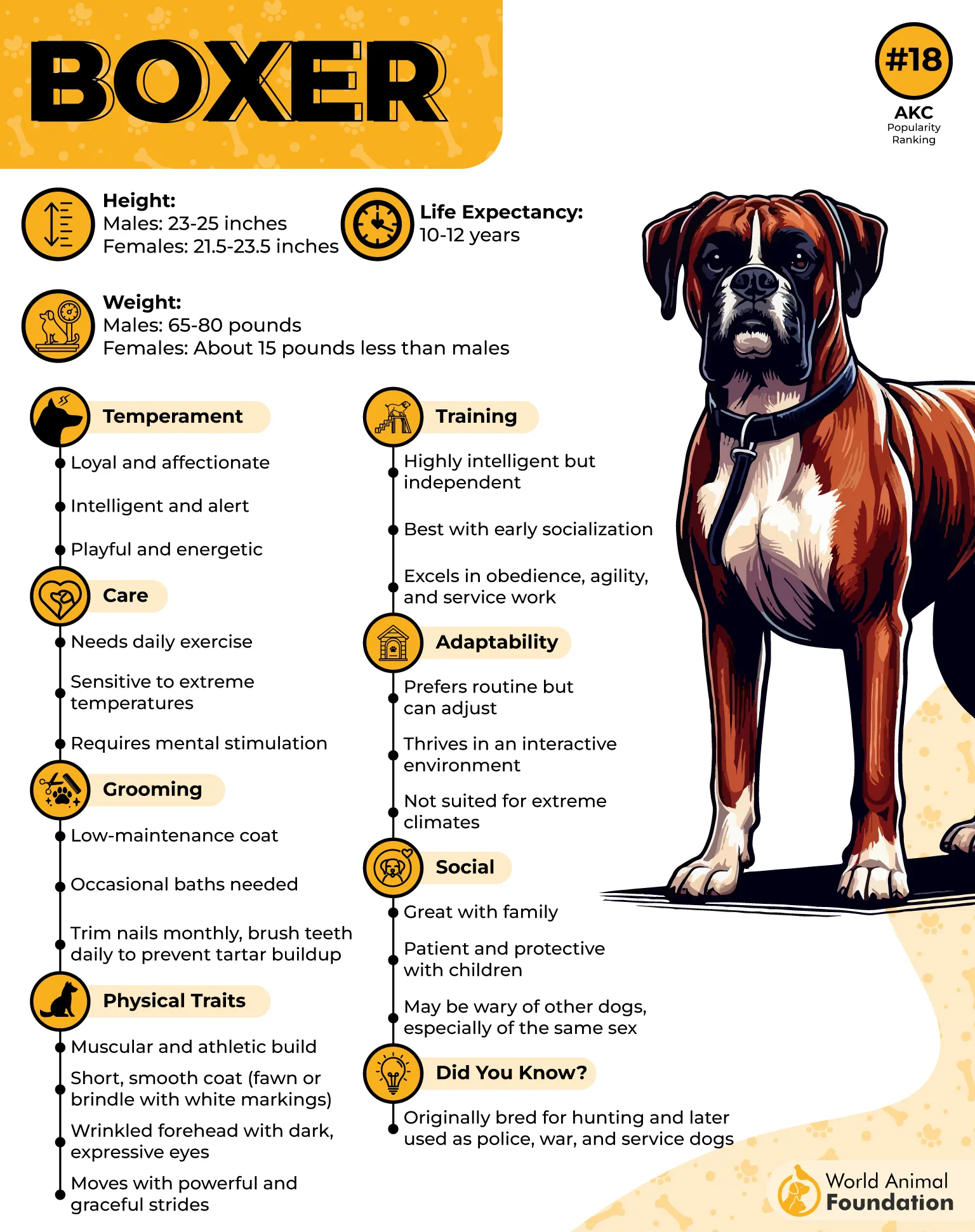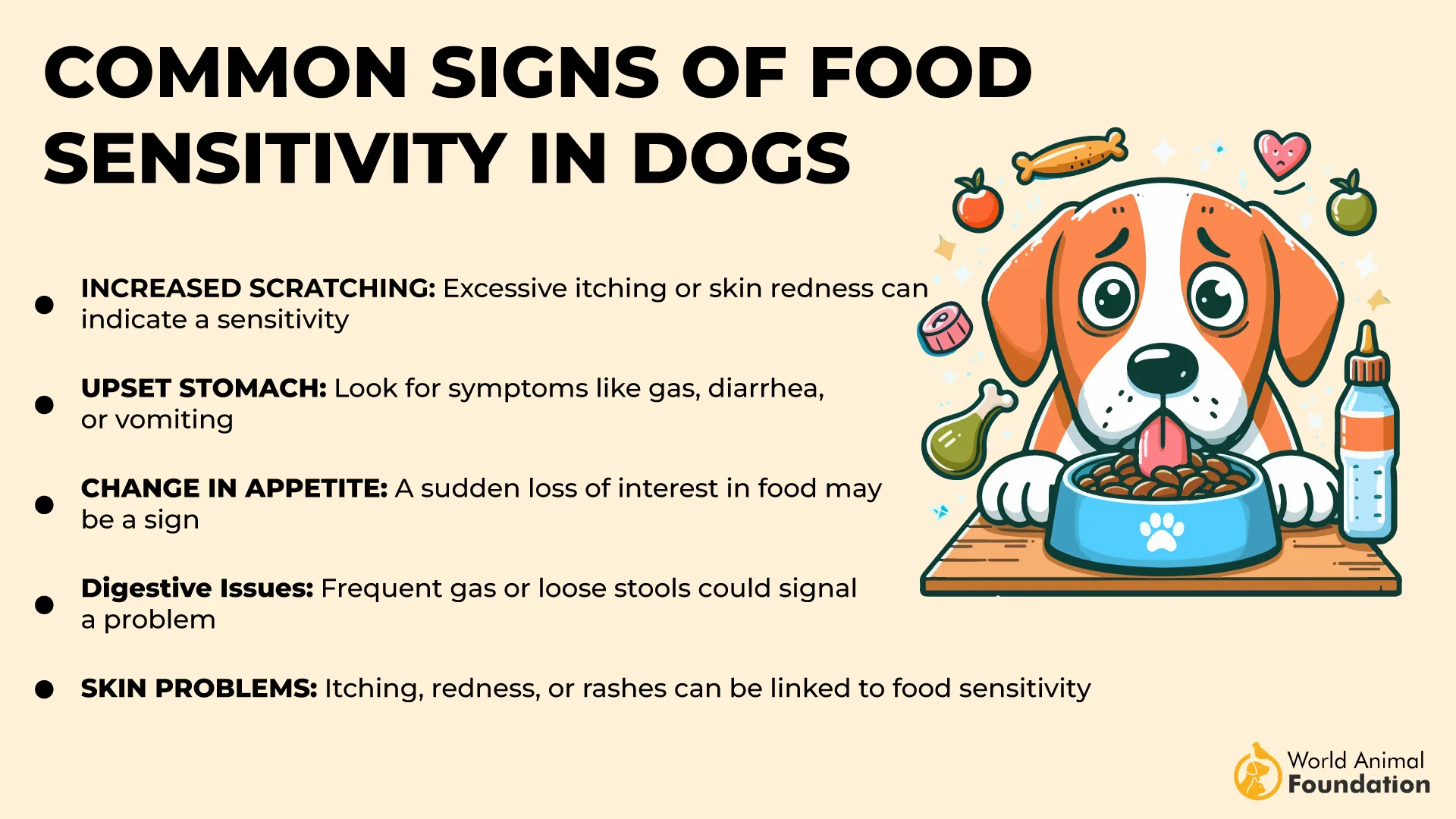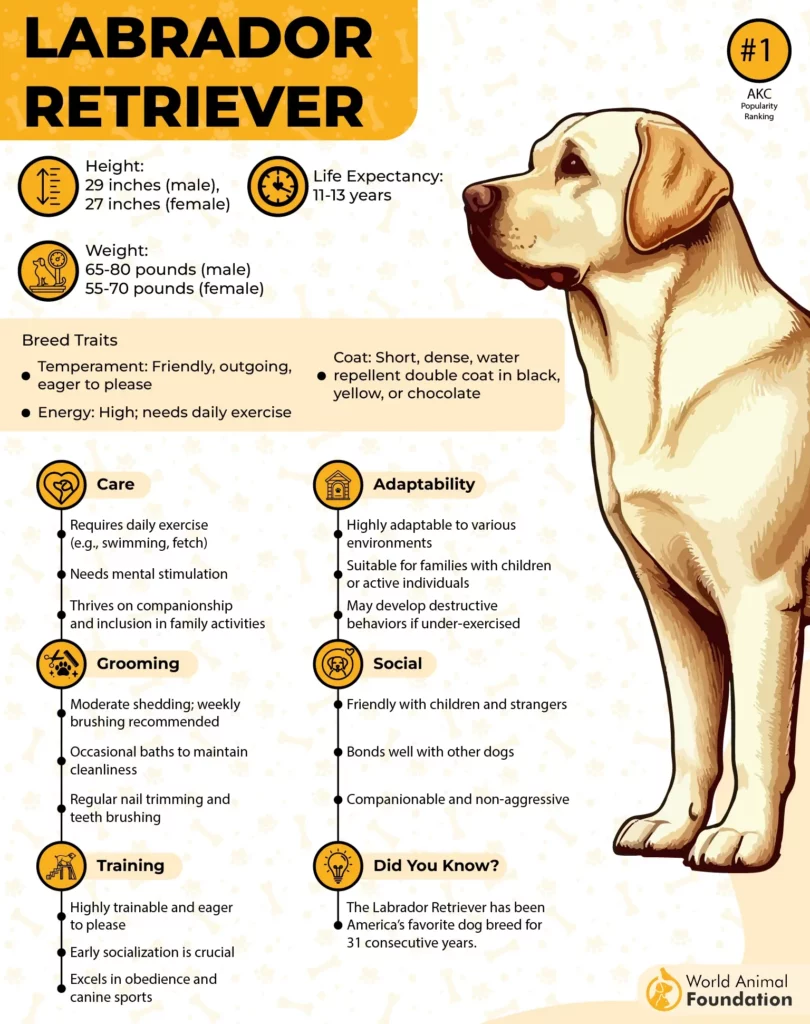Imagine having to skip your favorite meal every day because your body just can’t handle it; now imagine that’s your dog. While we often think of our pups as furry vacuum cleaners willing to eat just about anything, food sensitivities are surprisingly common across many breeds. In fact, some of the most popular dogs are among those most prone to dietary dilemmas. And just like in humans, these sensitivities can show up in unexpected ways, from itchy skin to persistent tummy troubles.
Discovering why your dog reacts poorly to certain ingredients can be both frustrating and eye-opening. Thankfully, understanding food sensitivities doesn’t mean giving up on delicious meals or happy mealtimes. It’s all about making smart, informed choices tailored to your pup’s unique needs.
These dogs with dietary quirks can lead full, vibrant lives with the right care. This article takes a closer look at specific dog breeds known for their food sensitivities.
Dog Breeds with Food Sensitivities
1. French Bulldog

With their irresistibly squishy faces and lovable personalities, French Bulldogs have soared in popularity, but their sensitive stomachs haven’t always kept up. This breed is notably prone to food sensitivities that often manifest as gastrointestinal distress or persistent skin irritation.
Pet parents might first notice issues like itchy skin, chronic ear infections, or irregular bowel movements, all of which can point to adverse reactions from certain foods.

Identifying the source of these issues can be tricky. Frenchies often develop intolerances to common protein sources like chicken, beef, or dairy. Because these sensitivities may not arise immediately, many owners are surprised to learn that long-time staples in their dog’s diet might suddenly become problematic. Eliminating these triggers and switching to a novel or limited-ingredient diet often helps alleviate symptoms.
Hydrolyzed or hypoallergenic dog foods prescribed by a vet tend to work best, especially those made with easily digestible proteins and minimal additives. Fresh, homemade diets can also be effective, but must be nutritionally balanced to ensure your pup’s health.
Managing a French Bulldog’s food sensitivities takes consistency and patience. But with a tailored diet and attentive care, these charming companions can thrive, snorting happily, with fewer tummy troubles to slow them down.
2. Boxer

The Boxer is a lively, affectionate breed known for its expressive face and strong bond with family, but beneath that playful exterior lies a predisposition to food sensitivities that can affect its well-being. As a medium-to-large breed with a muscular build and short coat, Boxers are particularly prone to allergic skin reactions, often triggered by common proteins such as chicken, beef, or dairy.
Food sensitivities in Boxers often appear as chronic itching, ear infections, or bouts of vomiting and diarrhea. Unlike acute allergic reactions, these sensitivities tend to develop gradually, making them harder to spot early on. Pet parents may initially mistake them for seasonal allergies or minor digestive upsets, but repeated symptoms can point to an underlying dietary issue.

A key step in managing these sensitivities is identifying the trigger through an elimination diet, ideally under veterinary supervision. Limited-ingredient or novel-protein diets, often using alternatives like duck or salmon, can help reduce flare-ups and restore digestive balance. Hydrolyzed protein formulas may also be beneficial for Boxers with more severe sensitivities.
Consistent management is crucial. Even trace exposure to problem ingredients can cause discomfort, so strict food routines and label reading become part of daily life. Fortunately, once the right diet is established, most Boxers show remarkable improvement in both energy levels and skin health.
By staying attentive to their dietary needs and working closely with a vet, owners can ensure their Boxer thrives, healthy, happy, and ready for every tail-wagging adventure.
3. German Shepherd

With their iconic stature and unwavering loyalty, German Shepherds are a beloved breed known for intelligence and versatility. However, many pet parents may be surprised to learn that these dogs are particularly prone to food sensitivities. Their predisposition stems from a combination of genetic factors and a heightened immune response, which can lead to uncomfortable reactions when exposed to common allergens like beef, chicken, dairy, or grains.
Food-related issues in German Shepherds often manifest through skin discomfort; itchiness, flaky patches, or redness around the face, paws, and ears are frequent signs. In many cases, these symptoms are accompanied by gastrointestinal distress, such as diarrhea or vomiting. This dual impact on both skin and digestion makes food sensitivities a significant concern for the breed.
The breed’s susceptibility to cutaneous adverse food reactions (CAFR) means that even high-quality commercial kibble might not suit their system, especially if it contains multiple protein sources or hidden allergens. Switching to a limited-ingredient or novel protein diet, like rabbit and peas or fish and potato, can help identify triggers through an elimination process. During this period, treats, flavored medications, and even shared water bowls must be monitored or avoided for accurate results.

Beyond dietary changes, ongoing care is essential. Probiotics and omega-3-rich supplements can help strengthen the immune system and soothe inflammation, while hypoallergenic grooming products may ease external symptoms. For long-term management, consistency is key; once a safe food is identified, sticking to it can prevent recurrences.
Ultimately, with mindful feeding and proper veterinary guidance, German Shepherds can thrive despite their sensitivities. Understanding and addressing their unique dietary needs not only improves their health but also deepens the bond between dog and owner.
4. Labrador Retriever

According to AKC, Labrador Retrievers are active, friendly, and outgoing. They are famously versatile, but their love of food can come with a downside: susceptibility to food sensitivities. These cheerful companions are among the breeds more prone to food-related issues, often reacting to ingredients like beef, dairy, or wheat. While not every Lab will develop problems, their genetic makeup makes them more likely candidates for dietary reactions than some other breeds.
Symptoms can range from persistent skin issues to gastrointestinal issues. Pet parents may first notice their Lab scratching excessively or suffering from recurring ear infections, which are common signs of food intolerance. These symptoms can easily be mistaken for environmental allergies, but when persistent, diet should be investigated as a potential root cause.

The good news is that Labradors typically respond well to dietary changes. With guidance from a veterinarian, many Labs thrive on limited-ingredient diets or prescription foods designed to minimize allergic triggers. Identifying the culprit usually involves an elimination diet lasting several weeks, during which owners must stick to strict feeding routines.

Though food allergies can’t be cured, they are highly manageable with the right nutritional plan. Once on a proper diet, most Labs show noticeable improvement, and many regain their playful, energetic demeanor. Their resilience and adaptability make them excellent candidates for long-term dietary management.
By staying observant and proactive, pet parents can ensure that their Labrador enjoys both good health and mealtime satisfaction.
5. Cocker Spaniel

Cocker Spaniel has a sweet-faced and playful personality, as per PetMD. They are a beloved family companion, but for many of these pups, mealtime can be a bit tricky. Known for their predisposition to food allergies, this breed often requires a more tailored approach to nutrition to keep their health and spirits high. Common culprits for sensitivities in Cocker Spaniels include beef, dairy, wheat, and chicken, with symptoms typically surfacing as itchy skin or recurring ear infections.
These dogs are particularly vulnerable to chronic ear problems, and food sensitivities are often to blame. If your Spaniel is constantly scratching or has inflamed, waxy ears, it could be linked to their diet. In fact, food allergies are among the most frequent causes of skin and ear issues in the breed, making early intervention essential.
Veterinarians frequently recommend elimination diets to pinpoint allergens, often beginning with a novel protein like duck or venison. Cocker Spaniels may respond best to hydrolyzed or limited-ingredient formulas, especially when paired with guidance from a vet or veterinary nutritionist. Once the offending ingredients are identified, long-term dietary management typically brings excellent results.
Due to their sensitive systems, Cocker Spaniels benefit from consistency. Avoid table scraps, flavored treats, and anything outside their prescribed diet, as even trace amounts of allergens can trigger flare-ups. With proper nutrition and vigilance, these charming pups can live healthy, itch-free lives.
Ultimately, a little dietary diligence goes a long way. With the right food plan in place, Cocker Spaniels can thrive and continue charming households with their affectionate, cheerful demeanor.
6. Chinese Shar-Pei

The Chinese Shar-Pei stands out with its independent streak and deeply loyal personality, as described by WebMD, but it’s also one of the more food-sensitive dog breeds. These dogs are particularly prone to food allergies that often manifest as chronic skin issues, such as inflammation and itchiness. As a result, a well-managed diet is not just important; it’s essential for keeping them comfortable and healthy.
Their sensitivity to food means Shar-Peis benefit greatly from diets that avoid common allergens like beef, dairy, wheat, and chicken. Owners frequently need to rely on prescription or limited-ingredient diets, especially during allergy flare-ups. A consistent feeding routine with novel proteins or hydrolyzed diets can make a remarkable difference in reducing symptoms.
Skin health is often the first to reflect dietary imbalances in this breed. Without proper nutrition, they may suffer from hair loss, red patches, and persistent scratching. Many Shar-Peis are also genetically predisposed to conditions that worsen when poor-quality food is involved, making diet management a top priority.
Their moderate energy levels don’t demand a high-calorie intake, but they do require nutrient-rich meals that support their immune system and maintain their signature skin folds. Regular veterinary checkups, paired with careful food monitoring, help prevent long-term complications.
For pet parents considering a Chinese Shar-Pei, understanding their unique dietary needs is key. With the right food and care, these distinctive dogs can thrive and remain the dignified companions they’re known to be.
7. Dalmatian

Sporting their iconic spots and a history that turns heads, Dalmatians are more than just a pretty face; they’re also one of the breeds known for food sensitivities. While these athletic dogs are full of energy and make great companions for active families, they often come with a unique dietary challenge rooted in their metabolic makeup.
Dalmatians have a genetic predisposition that affects how they process purines, a type of protein compound found in many meats. Instead of breaking down purines efficiently, their bodies convert them into uric acid, which can lead to the formation of urinary stones. This makes it essential for pet parents to provide a carefully balanced, low-purine diet tailored to the breed’s needs.
Food sensitivities in Dalmatians may manifest as digestive distress, including vomiting or loose stools, or even as skin issues like itchiness or irritation. Because these symptoms can overlap with other conditions, proper veterinary consultation is crucial before switching diets. Specialized formulas with alternative protein sources and limited ingredients often prove beneficial.
Adding to the challenge, Dalmatians may also be more prone to developing reactions to fillers and artificial additives. High-quality dog foods that exclude common allergens like beef, soy, and wheat are generally recommended. Hydration also plays a significant role in minimizing urinary complications, so encouraging regular water intake is vital.
With the right nutrition plan and attentive care, Dalmatians can thrive without sacrificing their well-being. A tailored diet not only supports their active lifestyle but also prevents painful health issues down the road, making life easier for both the dog and the people who love them.
Conclusion
Caring for a dog with food sensitivities might sound daunting at first, but with a little know-how and the right nutrition plan, it quickly becomes second nature. From spotted Dalmatians with purine concerns to other breeds prone to itchy skin or upset stomachs sometimes triggered by the most common food allergy or even flea allergy dermatitis, each has its quirks, but also an enormous capacity to thrive when their dietary needs are met. Recognizing the signs early, such as when a food allergy occurs, and learning how to diagnose food allergies can make all the difference in your pup’s well-being.
The good news? Sensitive doesn’t mean fragile. These breeds are lively, loving, and loyal, but with a menu that needs a bit more mindfulness, like avoiding certain types of animal protein that may aggravate food allergies in dogs. If you’re ready to serve up a bowl of tailored care and lots of love, you’re already halfway there. After all, dogs don’t need gourmet meals to be happy; just food that makes their tails wag and their tummies feel good.


